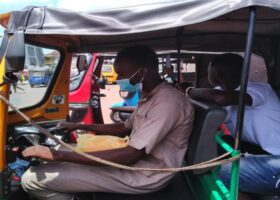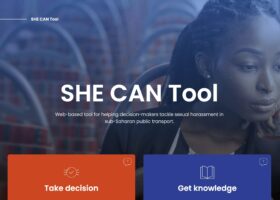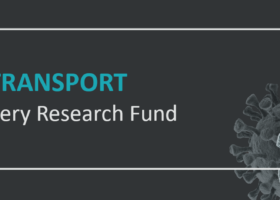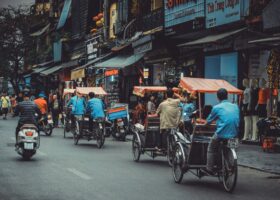Overview
This report examines the financial risks that the COVID-19 pandemic poses from a legal perspective to the mass transportation systems in eleven low-income countries in Africa. It examines how those risks may be mitigated, by adopting a proactive approach to a refinement of the legal and regulatory regime in respect of the mass transportation systems so as to mitigate potential future financial losses. The report provides a case study of Ghana to provide a specific guide on how the risks may be mitigated in that country taking into account its regulatory regime and transport infrastructure.
Publications with the same themes
Publications with the same study countries
Related news & events
News
News
News
News
Blog
News
Blog
PDF content (text-only)
1 COVID-19 Response & Recovery Transport Research Fund FINAL REPORT: Legislative and Regulatory Risk Management for Mass Transportation Providers in Low-income Countries to Mitigate the Financial Effect of COVID-19 November 2020 HVT029.L3S001 – Michael A Gleeson i Legislative and Regulatory Risk Management for Mass Transportation Providers in Low-income Countries to Mitigate the Financial Effect of COVID-19 This research was funded by UKAID through the UK Foreign, Commonwealth & Development Office under the High Volume Transport Applied Research Programme, managed by IMC Worldwide. The views expressed in this report are those of the authors and do not necessarily reflect the UK government's official policies, nor those of any individuals and organisations referred to in this report. Disclaimer The information contained in this article is for general guidance only. The application and impact of laws can vary widely based on the specific facts involved. Given the changing nature of laws, rules and regulations, and the inherent hazards of electronic communication, there may be delays, omissions or inaccuracies in information contained in this article. Accordingly, the information in this article is provided with the understanding that the authors and publishers are not engaged in rendering legal, accounting, tax, or other professional advice and services. As such, it should not be used as a substitute for consultation with professional legal, accounting, tax, or other competent advisers. While we have made every attempt to ensure that the information contained in this article has been obtained from reliable sources, we are not responsible for any errors or omissions, or for the results obtained from the use of this information. All information in this site is provided "as is", with no guarantee of completeness, accuracy, timeliness or of the results obtained from the use of this information, and without warranty of any kind, express or implied. IMC Worldwide Ltd, the HVT Programme and the UK government shall not assume any responsibility for the results of works based on the use of this report. Users accept this publication is a guidance document only. Users accept that they need to take their own technical and legal advice before issuing Agreements, Terms and Conditions and other legally binding documentation related to implementing any recommendations. Reference No. HVT029.L3S001 Lead Organisation/ Consultant Michael A Gleeson Partner Organisation(s)/ Consultant(s) N/A Title Legislative and Regulatory Risk Management for Mass Transportation Providers in Low-income Countries to Mitigate the Financial Effect of COVID19 Type of document Project Report Theme Urban transport Sub-theme COVID-19 Author(s) Michael A Gleeson Lead contact Michael A Gleeson Geographical Location(s) The Gambia, Sierra Leone, Liberia, Ghana, Nigeria, South Sudan, Uganda, Rwanda Abstract This report examines the financial risks that the COVID-19 pandemic poses from a legal perspective to the mass transportation systems in eleven low-income countries in Africa. It examines how those risks may be mitigated, by adopting a proactive approach to a refinement of the legal and regulatory regime in respect of the mass transportation systems so as to mitigate potential future financial losses. The report provides a case study of Ghana to provide a specific guide on how the risks may be mitigated in that country taking into account its regulatory regime and transport infrastructure. Keywords COVID-19, Pandemic, Mass transportation system, Legal & Regulatory. Funding FCDO/ UKAid Acknowledgements ii Legislative and Regulatory Risk Management for Mass Transportation Providers in Low-income Countries to Mitigate the Financial Effect of COVID-19 Issue Status Author(s) Reviewed By Approved By Issue Date 1 Draft Michael A Gleeson Nadeem Ahmed Bernard Obika 24/11/20 2 Final Michal A Gleeson Nadeem Ahmed Louise Cathro 01/12/20 iii Legislative and Regulatory Risk Management for Mass Transportation Providers in Low-income Countries to Mitigate the Financial Effect of COVID-19 CONTENTS 1. Executive Summary 1 2. Introduction 1 3. Remedial steps taken by HICs to financially protect economic infrastructure 2 4. Overview of legal & regulatory systems in LIC common law systems 3 4.1 Statute Law 4 4.2 Contract Law 5 4.3 Tort 5 5. Legal exposure of mass transportation providers during a pandemic 6 6. Remedial steps to protect mass transportation providers during a pandemic 6 7. Indemnities or amendment of the regulatory system 7 8. Conclusion 7 9. Ghana 8 Glossary of Legal Terms 13 References 14 TABLES Table 1: Checklist of Remedial Steps 12 FIGURES Figure 1: Hierarchy of types of laws and regulations 4 ACRONYMS BRT Bus Rapid Transport System COVID-19 Novel Coronavirus 2019 FCA Financial Conduct Authority FCDO Foreign Commonwealth & Development Office GDP Gross Domestic Product GRC Ghana Railways Corporation GRTCC Ghana Road Transport Co-ordinating Council HIC High-Income Country HVT High Volume Transport Applied Research Programme ISTC Intercity (STC) Coaches Ltd iv Legislative and Regulatory Risk Management for Mass Transportation Providers in Low-income Countries to Mitigate the Financial Effect of COVID-19 LIC Low-Income Country MMT Metro Mass Transit Ltd PWC Price Waterhouse Coopers UK United Kingdom US United States of America VSV Verbraucherschutz Verein 1 Legislative and Regulatory Risk Management for Mass Transportation Providers in Low-income Countries to Mitigate the Financial Effect of COVID-19 Guidance Document 1. Executive Summary This report will examine the financial risks that the Novel Coronavirus 2019 (COVID-19) pandemic poses from a legal perspective to the mass transportation systems in eleven low-income countries (LICs) in Africa. It will examine how those risks may be mitigated, by adopting a proactive approach to a refinement of the legal and regulatory regime in respect of the mass transportation systems so as to mitigate potential future financial losses. The report provides an overview of the current legal and regulatory regime in respect of the eleven LICs, identifies the potential legal and financial exposure of the mass transportation systems in those eleven countries as a result of the pandemic and provides guidance as to how the legal and regulatory systems governing the mass transportation systems can be modified to mitigate those legal and financial risks. Finally, the report provides a case study in respect of one of the LICs (Ghana) to provide a specific guide on how in that country the risks may be mitigated taking into account its regulatory regime and transport infrastructure. 2. Introduction The purpose of this report is to explore some of the legal steps that could be taken, by LICs to protect and preserve the financial wellbeing of their mass and paratransit transportation systems from the seismic economic shocks that could affect them as a result of the COVID-19 outbreak. In a relatively short time since the outbreak of the pandemic, a significant volume of publications1234 have emerged detailing what physical steps can be taken to mitigate the effect of COVID-19 on mass and paratransit transportation systems, bringing in measures to safeguard passengers through enhanced cleaning regimes, masks and social distancing etc. There are also publications on the economic impact on public transport systems5 due to changes in demand, behaviour and capacity reduction for paratransit systems particularly in LICs. However, there appears to be a deficit in respect of research into how the organisations providing mass transportation, be they government agencies or private sector organisations can be protected from the legal and therefore financial impact they may experience as a result of the pandemic. Almost by definition the mass transportation providers in LICs are unlikely to be as financially robust as their equivalents in High-income Countries (HICs) particularly those systems that rely on state funding. It is likely that the mass transportation systems in the LICs will already have taken an economic hit as a result of the pandemic such as lower passenger numbers and increased costs linked to mitigating the effect of the pandemic (World Bank Press Release 3rd August 2020)6 . These entities do not wish to face legal actions or class actions in the future from passengers or employees who claim they suffered loss or damage either by contracting COVID-19 whilst using the transport system or alternatively have suffered economic loss as a result of changes that had to be made to the transport system as a result of the pandemic. It should be recognised that in LICs, implementing some of the suggestions in this report will not be a "zero sum game". At section 7 of this report "Indemnities or amendment of the regulatory system" we discuss the fact that many HICs adopt an indemnity regime rather than seeking to limit legal liability by amending legislation. As HICs are economically in a position to do this, it can for them make sense, as the economic infrastructure can be protected with minimum disruption to the regulatory system and apart from taxpayers, 1 https://dpi.wi.gov/sites/default/files/imce/sspw/pdf/Interim_COVID19_Transportation_Guidance.pdf 2 https://www.who.int/publications/i/item/9789240012554 3 https://www.afro.who.int/sites/default/files/2020-04/Guidelines%20on%20COVID-19 4 https://www.gov.uk/government/collections/coronavirus-covid-19-transport-and-travel-guidance 5 https://rejerusalem.com/331796/the-economic-impact-of-coronavirus-on-transportation-management-systems-tmsmarket-brief-analysis-and-application-growth-by-2025/ 6 https://www.worldbank.org/en/news/press-release/2020/08/03/covid-19-forced-businesses-in-ghana-to-reducewages-for-over-770000-workers-and-caused-about-42000-layoffs-research-reveals 2 Legislative and Regulatory Risk Management for Mass Transportation Providers in Low-income Countries to Mitigate the Financial Effect of COVID-19 no particular sector of society loses out. The position is not the same in LICs. In LICs due to the pressure on economic resources, choices need to be made, and in respect of any policy introduced, there are likely to be losers. These are political decisions (as they are in HICs) but with a greater negative impact. If a LIC decides to change the regulatory regime to protect its mass transportation infrastructure, by reducing the ability of users and employees to claim damages for any loss they incur whist using the system and possibly contracting COVID-19, the government is making a political decision to favour the preservation of the mass transportation system as a whole, to a certain extent at the expense of the individual rights of passengers and employees. Those choices are for politicians. The purpose of this report is to examine in LICs how the legal, regulatory and contractual regimes that these transport systems operate under can be refined or modified either permanently or temporarily to provide the transportation infrastructure with protection during and after the pandemic. The aim is to ensure that the organisations providing the mass transportation remain functioning and intact long after the COVID-19 pandemic ends. The concern is that LICs are not as proactive as HICs in amending their legal and regulatory systems and that there is a danger that the organisations responsible for either regulating or indeed running the mass transportation systems open themselves up to civil and potentially criminal liability risking substantial financial liability in the future as a result of COVID-19, if the legal and regulatory systems are not modified or altered to protect them. This report attempts to identify potential areas of legal exposure of the regulators/providers and considers whether some laws, regulations and contractual terms should temporarily be amended, or suspended, until the pandemic is over to remove the danger of mass transportation being overwhelmed by legal claims arising from the pandemic. Whilst not all financial risks can be mitigated, a temporary and potentially simple revamp of the regulatory system does not have to be a costly exercise and can lead to future potential cost savings. Examples are presented below of current and historic steps that some HICs have taken to safeguard, through legal and regulatory means, parts of their infrastructure and economy that they deem worthy of protection. This report does not attempt to examine wider restructuring or insolvency issues that might arise in the mass transportation sector of LICs as a result of the impact of COVID-19. 3. Remedial steps taken by HICs to financially protect economic infrastructure Although not widely publicised, HICs take a proactive approach to their legal and regulatory systems at times of crisis. The emergency can be political, economic, military, social or medical. The existing sets of laws and regulations applying in a particular sector are quickly adapted to protect the particular sector or stakeholder at risk. Recent COVID-19 examples:  The Coronavirus Act 2020. Royal Assent 25th March 2020 plus other Primary and Secondary Legislation7 . A summary of the main Act has been produced by The Institute for Government8 . This Act provided (amongst other things) indemnities to the NHS and pharmacies carrying out work for the NHS in respect of claims made against those organisations in relation to COVID-19. (UK);  Corporate Insolvency and Governance Act 2020. Royal Assent 25th June 2020. In respect of the current COVID-19 outbreak, the UK government has amended the Insolvency Rules to provide a new restructuring route for saving large businesses and a moratorium on creditor action that risks putting companies into liquidation. (UK); 7 https://www.legislation.gov.uk/coronavirus 8 https://www.instituteforgovernment.org.uk/explainers/coronavirus-act 3 Legislative and Regulatory Risk Management for Mass Transportation Providers in Low-income Countries to Mitigate the Financial Effect of COVID-19  3rd April 2020 – UK Govt issued indemnities to manufacturers of ventilators in case of legal claims relating to intellectual property infringement or product liability claims such as death or personal injury to a patient and patient loss of earnings, caused by defective machines. (UK);  Amendment of housing repossession rules in respect of both owner occupiers and tenants. (UK)9 – Some of the most recent guidance to UK lenders in respect of property repossessions was provided by the Financial Conduct Authority (FCA) in Guidance Notes issued in October 2020;  Qualified Indemnities to GlaxoSmithKline (re Pandemrix), Baxter International (re Calvapan) and Sanofi Pasteur SA (re Liquid Smallpox Vaccine VV Lister/CEP) for civil cases arising as a result of new vaccines. (UK) (Source Nicholas Curry – Ministerial Correspondence and Public Enquiries, Department of Health pursuant to a Freedom of Information Request of 16th April 2020);  The UK Govt is in the process of changing the regulations under which train operators operate, in the light of COVID-19. (UK);  The Financial Conduct Authority (FCA) has urgently gone to the High Court to establish whether insurance companies are acting legally by not honouring certain "Business Interruption Policies" where it is alleged the pandemic is responsible for the business interruption. (UK);  The US Senate already passed four bills focussing on liability protections for businesses, schools and other entities as a result of COVID-19. (US);  In the US, President Trump added new contractual conditions to terms of admission to his political rallies to exclude the organisers from any legal liability if attendees' contract COVID-19 as a result of attending a particular rally. (US). Recent Non-COVID-19 Examples:  The 2008 Banking Crisis, where emergency legislation was introduced to protect UK banks. (UK);  When there was a spate of terror attacks with vehicles being used as weapons to kill pedestrians, the UK Govt changed regulations to ensure that insurance companies who had insured those vehicles, were liable to pay out to the victims of the attacks whereas previously, the insurance companies had refused to pay out if a vehicle was "used as a weapon". (UK). Both sets of examples, measures introduced as a result of COVID -19 and the examples provided in respect of non-COVID-19 emergencies illustrate that in HICs, the legal and regulatory system is dynamic rather than passive. The examples show that HICs attempt to protect significant parts of their economic infrastructure from the potential adverse financial consequences arising out of many different types of crises. Whilst this report concentrates on LIC mass transportation systems, the general principles discussed could equally be applied to other sectors of LIC economies. 4. Overview of legal & regulatory systems in LIC common law systems The legal systems of many LICs in Africa are based on the legal system they inherited from former colonial powers. Most former French and Portuguese colonies have legal systems based on the Napoleonic code, whereas the former British colonies have a common law system. In this report we propose to concentrate on those eleven LICs that have a common law system. Those eleven countries are The Gambia, Sierra Leone, Liberia, Ghana, Nigeria, South Sudan, Uganda, Rwanda (this was not a former UK colony, but it moved to the common law system), Tanzania, Malawi and Zambia. Whilst this report takes a "pan-jurisdictional" view of this issue and examines common law LICs as a whole or a group, we provide a case study based on one of the countries (Ghana) to provide an illustration of how the advice provided can be implemented in a particular jurisdiction. A bespoke solution would be required for each common law LIC, as each country will have a regulatory system and transport infrastructure that is unique to it. 9 https://www.anthonygold.co.uk/latest/blog/new-notice-periods-for-landlords-seeking-possession-of-residential-property/ 4 Legislative and Regulatory Risk Management for Mass Transportation Providers in Low-income Countries to Mitigate the Financial Effect of COVID-19 In any legal system there is a "hierarchy of laws". Basically, this means that some laws/regulations take precedence over others. The graphic below provides a basic outline setting out how the legal and regulatory system in relation to the provision of mass and paratransit transportation would be scrutinised for possible modifications to mitigate the financial effect of COVID-19 on those systems. Figure 1: Hierarchy of types of laws and regulations There are three sources of law that will regulate a national mass transportation system, for example a national bus/coach service. In the following sections we provide a brief overview of the different types of laws that will apply to mass transportation systems in common law jurisdictions, and the inter-relationship between these different types of laws and regulations. 4.1 Statute Law This would include Primary Legislation, Secondary Legislation, Statutory Instruments, Statutory Regulations and Rules and Delegated Legislation. In addition, regional and local governments and councils may pass their own local bye laws – which will always have to be consistent with national laws and are generally subject to them. An Act of Parliament or of any national Legislative Assembly (statute law) is known as Primary Legislation. Secondary legislation is law created by ministers (or other bodies) under powers given to them by an Act of Parliament. Secondary Legislation can include statutory instruments, rules and regulations. In addition to these national laws, countries often have different geographical administrative regions for which we will use the generic term regional government, and each of these regional or local governments will have a mandate and powers from the national government to legislate on and regulate particular sectors of society and the economy in their administrative area. These powers are basically devolved to them by the central government. Areas in which it is common to devolve powers to regional administrations include health, transport and education. Whilst it would be common for central government to create a national "framework" through Primary Legislation for a particular sector, it would not be uncommon for powers to be devolved to local administrations so that more detailed rules and regulations could be drafted locally, taking into account local conditions and requirements whilst fitting in with the national framework as laid down by the central government. 5 Legislative and Regulatory Risk Management for Mass Transportation Providers in Low-income Countries to Mitigate the Financial Effect of COVID-19 In the field of mass transportation, it is likely that central government in respect of road, rail and depending on the circumstances waterways (coastal and inland) would set out a national framework of rules and regulations relating both to the transport infrastructure and also in relation to organisations that provided transportation services. It is likely that local administrations would have delegated powers to legislate for and regulate in a more detailed way, the transport system within its own local jurisdiction. It would do this with local laws, regulations and bye laws. 4.2 Contract Law Contract law tends to govern the economic relationship between a purchaser and a seller of goods and/or services, or in the case of transportation the relationship between the passenger and the carrier, or employer and employee. Whether the transport provider is a state owned enterprise or a private company, there will generally always be a personal contract between the passenger and the carrier (written or oral). When the passenger purchases his ticket, he is entering into a contract with the carrier and will be travelling subject to the contractual conditions of the carrier. As a general rule, the contractual conditions are written down but will probably only be displayed at the bus station, railway station or ticket office of the carrier. Most passengers never read the contractual conditions but except in unusual circumstances will be bound by them. As a general rule, the contract must not include terms that would conflict with national and local "statute" laws. In some jurisdictions there will be statutes that regulate what must go into a contract and what cannot go into a contract. For example, it is not unusual for some jurisdictions to make a contractual term totally ineffective or subject to a "reasonableness" test for it to be effective. Some jurisdictions make it impossible for a contract to exclude or restrict liability in negligence for personal injury or death. In a pandemic, such a situation could open up a carrier to a multitude of claims from passengers who were infected by COVID-19 whist travelling. In common law jurisdictions, the law will also act to insert "implied terms" into a contract, where those terms are not expressly set out in the contract. These terms will vary from jurisdiction to jurisdiction. Those terms can be implied by statute, by the court or by custom. For example, in respect of a contract for travel, notwithstanding what is expressly stated in the contract, there might be an "implied term" that the carrier will provide the passenger with a "safe system of travel". Consumer protection legislation adds "implied terms" to contracts that consumers enter into particularly where the consumer is dealing with a purveyor of services who is in a dominant position. 4.3 Tort The law of Tort is extremely difficult to define. Broadly speaking, as Winfield & Jolowicz on Tort (18th Ed) explain, "tort is concerned with the allocation of responsibility for losses which are bound to occur in society". No legislation is needed to create a tortious relationship between parties. A tortious relationship needs no contractual relationship. There merely needs to be a duty of care owed by one party to the other. A tortious act is committed where one party who owes a duty of care to another, breaches that duty of care and the party against whom the breach has been committed, suffers a reasonably foreseeable loss. For example, in the case of a passenger on a train, it is likely that the passenger will have a contractual relationship with the carrier, plus a tortious relationship; the carrier will owe the passenger a duty of care. In fact, one could go even further and easily envisage a situation where a passenger could travel on a railway for one stop, and in that contract, there would be terms imposed by statute, contractual terms, plus a tortious relationship. There may be instances where somebody using a transport network has no contractual relationship with the transport provider. One example that comes to mind is where members of a family go to a station to greet or collect a friend or member of the family who has travelled by train. The passenger being collected will have a contractual relationship with the carrier through the purchase of his ticket. The family collecting him will have no contractual relationship with the carrier as they have not travelled. However, it is clear that the carrier has a duty of care to people who are meeting their passengers whilst on their premises, 6 Legislative and Regulatory Risk Management for Mass Transportation Providers in Low-income Countries to Mitigate the Financial Effect of COVID-19 and any breach of that duty of care would be a tortious act and may open up a claim for damages by the family collecting the passenger. 5. Legal exposure of mass transportation providers during a pandemic The statutes, rules and regulations that govern mass transportation systems were conceived and implemented without necessarily taking into account the onset and effect of a pandemic. Duties and obligations of transport operators, to both their employees and their passengers, were drafted assuming that the transport system was operating in "normal times". These are not normal times. Without further detailed research, it is not possible to comment on the position in each LIC, however, it is safe to assume that in the light of COVID-19 it is unlikely for the foreseeable future that transport operators will be able to guarantee a safe working environment for their employees (as regards COVID-19) and there will be the same difficulty in providing a safe "travel environment" for their passengers, even if, for example, all guidance provided by the International Road Union was followed (M Peden & O Kobusingye, 2000). The unfortunate truth is, that notwithstanding the best efforts of transport operators, it is likely some employees and some passengers will contract COVID-19 whilst travelling on mass transportation systems. Notwithstanding the proactive steps taken by HICs, these remain areas where they can leave themselves open to claims. One example is the outbreak of COVID-19 at the Austrian ski resort of Ischgl where an outbreak allegedly affected 6,170 people from 40 different countries10. A private consumer protection association Verbraucherschutz Verein (VSV) is representing 1000 people who are considering bringing a class action against the Austrian government. Four test cases have been started. It is alleged that people contracted COVID-19 on the buses that transported them to and from the resort and at après ski venues. Peter Kolba, the head of VSV said that a hasty and delayed quarantine and evacuation on 13th March 2020 led to tourists having to take crammed buses, which led to further infections11. One of the allegations is that the Austrian government was aware that COVID-19 was present at the resort and delayed in taking appropriate measures to protect users of the resort from the virus and, indeed, exposed them to it on the transportation system. We do not at this stage know for certain, but it is likely in LICs, that as drafted, the current laws and regulations may give employees and passengers legal redress against the operators and regulators (see Austrian example above). Given the large number of passengers involved there is potentially a heavy financial cost to be borne by either regulators or operators, if the courts find in favour of employees or passengers who contracted COVID-19 whilst travelling or working on the mass transportation systems. Before the pandemic it was not reasonably foreseeable12 that a passenger or employee could contract COVID19 on a transport system (so arguably no legal liability). In the current situation it now is reasonably foreseeable that a passenger or employee could be infected by COVID-19 whilst travelling or working on a transport system. This opens up a potential legal liability for the carrier, both to passengers and employees. It is reasonable to assume that when the applicable laws and regulations were drafted, it was not intended to make the carriers legally liable for damages to their passengers and/or their employees arising as a result of a pandemic. Without adopting some of the proactive steps that HICs have taken in respect of their legal and regulatory systems, there is a danger that LICs in respect of their mass transportation sector may leave themselves liable to class actions and various other legal claims as a result of their passengers and employees contracting COVID-19 whilst travelling or working on these transportation systems. 6. Remedial steps to protect mass transportation providers during a pandemic A solution to the problem might be, for each LIC, to examine the mass transportation legal, regulatory and contractual regime in force and where necessary, make temporary changes to the laws and regulations to limit or exclude any liability to any person or entity, for any loss arising from contracting COVID-19 whilst 10 https://uk.reuters.com/article/us-health-coronavirus-austria-ischgl/civil-lawsuits-filed-over-covid-19-outbreak-at-austrianski-resort-ischgl-idUSKCN26E1A6 11 https://www.bbc.co.uk/news/world-europe-54256463 7 Legislative and Regulatory Risk Management for Mass Transportation Providers in Low-income Countries to Mitigate the Financial Effect of COVID-19 working or travelling on a particular mass or paratransit transportation system. Some LICs may wish to treat their potential liability to passengers and their potential liability to their employees differently. Others may wish to treat their passengers and employees in a similar way. In respect of this "statute law", to protect the transport infrastructure from claims arising from the pandemic, it may be necessary to modify particular statutes relating to the obligations of carriers to their passengers and employees in relation to any damage done to them as a result of the pandemic. In addition, it may be necessary to remove either express or implied consumer protections. Further, it may be necessary to remove provisions preventing a carrier from contractually, or as a matter of tort, excluding themselves from any liability in respect of personal injury that might arise as a result of the pandemic. In respect of "contract law" the carrier may wish to alter the contractual basis upon which they employ staff or carry passengers to exclude a liability arising out of COVID-19. The amendments to applicable "statute law" (see above) would permit them to do this. The carrier would however need to make employees and passengers aware of the existence of the new terms. In respect of "tort", as this is a common law remedy and is not based on a contract, but merely a duty of care, liability for COVID-19 could only be excluded by statute – see above. 7. Indemnities or amendment of the regulatory system One aspect that needs to be given careful attention to is the question of indemnities.Many HICs, rather than formally amending their legislation or regulatory systems (which can be cumbersome) have opted instead to protect various parts of their infrastructure or particular sectors of the economy by the granting of indemnities. These indemnities have been granted to selected companies, healthcare providers and transportation organisations. (See examples in section 3 above). LICs however need to understand that the granting of an indemnity does not extinguish any liability. For example, in respect of a train company being found liable for negligently allowing a passenger to contract COVID-19 whilst travelling with it, any indemnity given to the train company, merely transfers the liability to somebody else, most likely the government. For LICs, the indemnity solution is probably not ideal as the liability remains but is merely paid by the government which in an LIC, may not have sufficient resources, unlike a HIC. Temporary amendments in respect of the regulatory system, could extinguish the liability entirely and ultimately would be far less costly. 8. Conclusion This report has set out some of the financial consequences that can impact on countries both HICs and LICs where there is a sudden and unforeseen crisis. The crisis can be caused by political instability, an economic crisis or a natural disaster. HICs are aware of the damage that such crises can cause to their economic and social infrastructure and are proactive at taking steps particularly in respect of their legal and regulatory regimes to mitigate such financial loss. This report has provided examples of steps that HICs have taken in respect of both COVID-19 and previous crises to protect their economic infrastructure. Those steps have extended to all sectors of their economy. The report has highlighted the financial impact that the COVID-19 pandemic could have on mass transportation systems in LICs and in respect of the eleven common law countries in Africa has provided an overview as to how that group of countries might alter the legal and regulatory system to protect their mass transportation infrastructure. There now follows a case study in respect of one of the eleven LICs, Ghana and specific suggestions are made in the case study taking into account the current mass transportation system in Ghana with a view to providing guidance as to what steps might be taken to mitigate the economic effect of the pandemic on the Ghana mass transit system. 8 Legislative and Regulatory Risk Management for Mass Transportation Providers in Low-income Countries to Mitigate the Financial Effect of COVID-19 Case Study 9. Ghana 9.1.1 Methodology Ghana has been chosen for this case study on the basis that it is a good representative example of the eleven LICs. It has a national government rather than a federal structure. It has a transport infrastructure that includes, road, rail, internal waterways and domestic airlines. It therefore contains all elements of a mass transportation system, and therefore many of the conclusions reached in respect of Ghana could be applied to the ten other LICs. We have considered the different types of mass transportation systems, in the case of Ghana, private and public transport providers in respect of passenger road travel, the Ghana railway system, ferries, waterways and marine transport plus domestic aviation. In this case study we have first of all looked at the overall statutory regime relating to each sector of the Ghana mass transportation system. Having considered the statutory regulatory regime, we have then considered the contractual and tortious relationship that each carrier has with its passengers. In respect of each mass transportation sector, we have made suggestions as to how each, may implement or have some liability protection implemented so as to mitigate and protect each sector from some of the legal and therefore financial consequences of the pandemic. 9.1.2 Overview of Ghana Mass Transportation System According to the Ghana Statistical Service13, the transport and carriage sector contributed GHS 24.6bn ($5.3bn) to the economy in 2017. It accounted for 12.8% of Gross Domestic Product (GDP), in line with the 12.5% share averaged over the period 2006-2016. Price Waterhouse Coopers (PWC) state that Ghana has an advanced infrastructure platform when compared with other LICs in Africa, but as it approaches middle-income status the infrastructure will need to be upgraded. (PWC)14. The Oxford Business Group stated15 "The size of the sector's GDP contribution is indicative of its importance in the country's ongoing economic development. Sound investment in transport infrastructure and equipment can create a virtuous circle by supporting broader economic growth". The necessity to protect the transport infrastructure during and after the pandemic is clear. The main mass transportation system for passengers in Ghana is the road system that carries 95% of all passengers in the country16 . The railways are only responsible for 2% of all freight and passenger traffic (PWC) and domestic flights in 2019 accounted for only a total of 690,000 passenger journeys. (Ghana Civil Aviation Authority). On waterways and ferries, the annual passenger count was approximately 647,000 (Volta River Authority). 9.1.3 Roads As can be seen from the overview above, road transport is by far the most important means of moving freight and passengers in Ghana. According to the World Bank, roads carry 95% of all passengers and 98% of all freight. The government spends 1.5% of GDP on roads. The road network is approximately 65,000 km. Given the overwhelming importance of the road system to masstransportation in Ghana, this case study will concentrate primarily on the steps that can be taken to mitigate the financial impact of COVID-19 on road using mass 13https://ghana+statistical+service&qs=AS&pq=ghana+statistical+&sk=AS1&sc=618&cvid=8DB1A422A93F44DEBBC0F79F239D8B67&FOR M=QBRE&sp=2&ghc=1 14 https://www.pwc.com/gx/en/transportation-logistics/publications/africa-infrastructure-investment/assets/ghana.pdf 15 https://www.oxfordbusinessgroup.com/ghana-2020/country-profile 16 https://www.gipcghana.com/invest-in-ghana/why-ghana/infrastructure/transportation-infrastructure.html 9 Legislative and Regulatory Risk Management for Mass Transportation Providers in Low-income Countries to Mitigate the Financial Effect of COVID-19 transportation providers. The Ghana Poverty Reduction Strategy has described transport improvement "as an integral component for increasing national productivity and hence poverty reduction". The road system is under the jurisdiction of the Ministry of Transport (www.mot.gov.gh) and its eleven agencies. These are:  Intercity STC Coaches Ltd  Metro Mass Transit Ltd  Volta Lake Transport Company Ltd  Driver Vehicle and Licensing Authority  Ghana Road Safety Commission  Ghana Ports and Harbour Authority  Ghana Shippers Authority  Ghana Maritime Authority  Regional Shipping Authority  P.S.C. Tema Shipyard  Government Technical Training Centre In urban areas the road users are mainly commuters going to work, children going to school etc. Most of this transport is provided by private transport including private cars, taxis, mini-busses and state/private run bus services. Buses and mini-buses (sometimes referred to as trotro) account for approximately 60% of all passenger movement. It is estimated that half of these journeys are completed on "jitneys" which means they have no fixed schedules or stop locations although they may have specific departure and destination points. Taxis account for approximately 15% with the remainder down to private cars. 9.1.3.1 Metro Mass Transit Ltd The largest provider of mass transportation on the Ghana road network is Metro Mass Transit Ltd (MMT). The company was founded in 2003 and is 45% owned by the Ghana government and 55% by six large private institutions. In 2008 it had a fleet of 1000 buses and in 2007 carried approximately 40 million passengers. In 2008 it had approximately 3,000 employees. In 2016 Ghana's Aayalolo Bus Service was introduced in Ghana's capital city Accra, on the Amasaman to Accra Central Business District transport corridor. Scania supplied 300 buses for this "Bus Rapid Transport System" (BRT) pursuant to an agreement with Ghana's Ministry of Transport. BRTs are popular as LICs do not have resources to embark on large scale rail transit projects and BRTs offer a low cost alternative with an ability to transport large numbers of passengers. 9.1.3.2 Intercity STC Coaches Ltd Intercity STC Coaches Ltd (ISTC) provides intercity road travel in Ghana. Like Metro Mass Transit above it is partially state owned and partially owned by private investors. It was originally set up to provide intra-city transport services. 9.1.3.3 Private Operators For journeys between towns and cross-country, these routes are mainly covered by 23 identified public transport operators who belong to one recognised organisation, the Ghana Road Transport Co-ordinating Council (GRTCC). The typical vehicles used are 14-54 seater buses. One of the hurdles that makes regulation of public passenger road traffic difficult, is that private operators dominate the industry. In his article Edayatu Lamptey estimates that "In Accra alone, modal share for informal transport is more than 70%. Private operators dominate the industry, with MMT contributing less than 5% of the total passenger traffic." 9.1.3.4 Proposed Remedial Action There are challenges in respect of the regulatory regime for the mass transportation of road users in Ghana. Whilst there is one agency to oversee rail travel, the Ghana Rail Authority, one agency for aviation the Ghana 10 Legislative and Regulatory Risk Management for Mass Transportation Providers in Low-income Countries to Mitigate the Financial Effect of COVID-19 Civil Aviation Authority, one agency for maritime transport the Ghana Maritime Agency. In respect of road passenger transport, there are various agencies, the Driver Vehicle and Licensing Authority, The Police Motor Traffic Department and the National Road Safety Commission in addition to the Ministry of Transport itself. MMT and ISTC are private companies albeit with significant state investment and the GRTCC is a trade organisation representing a small proportion of small private operators in the sphere of public transport. If the figure of 70% of public transport in Accra being supplied by private contractors is correct, there is a significant challenge in amending regulations that relate to them, as at the moment, private contractors do not appear to be subject to a fully functioning regulatory system. Alternatively, it could be argued that the lack of a comprehensive regulatory regime, may make "ad hoc" changes easier. In respect of MMT and ISTC, the position is simpler. The government is already a substantial stakeholder in both companies, and it would be fairly easy to amend any legislation or contractual terms in the manner as set out in section 6 above so as to eliminate any potential liability of MMT and ISTC to their passengers or employees in respect of the pandemic. As the government is in a partnership with the private sector with both these companies, it might wish to consider whether an indemnity regime might be more appropriate. In any event, MMT and ISTC should consider revising their current terms and conditions for their passengers and possibly employment contracts, regardless of what steps central government might take. In respect of employment contracts and terms and conditions for passengers, consideration should be given as to whether to amend these to exclude liability for any loss arising as a result of contracting COVID-19. On a more general level, the government might wish to introduce legislation to specifically remove any protections offered by any existing consumer protection legislation, and in respect of mass transportation generally limit or exclude any liability in respect of COVID-19 of the government or transport providers to their passengers and/or employees. These measures could be temporary, have a "sunset" clause or be permanent. 9.1.4 Rail According to PWC, "Ghana's railway network is insignificant and appears largely neglected. It currently handles less than 2% of freight and passenger traffic." The current railway network is mainly single track and confined to the south of the country. Although substantial investment is planned for the railway infrastructure, this appears to be very much "a work in progress". There are plans to privatise the state owned Ghana Railways Corporation (GRC). For the purpose of this report, given the current overall insignificance of the railway as a provider of masstransportation, we will not designate it as a mass transportation provider and not spend too much time examining it. Notwithstanding this, there are plans to upgrade the railway infrastructure, and these plans include projects to change tracks to standard gauges and the construction of new lines. If these improvements were made, then in the future, steps might need to be taken to protect an upgraded railway infrastructure from the economic consequences of a future pandemic. Regulators might wish to "future proof" the railway infrastructure when considering the drafting of terms and conditions of carriage, as and when such upgrades occur and particularly if there is a privatisation of GRC. 9.1.4.1 Proposed Remedial Action As with MMT and ISTC above, the GRC might take some straightforward steps by altering its terms of carriage for its passengers and possibly its employment contracts. If central government did not make changes to current regulations affecting the railway sector, then any changes made by GRC would need to be consistent with national legislation. As with roads the government might wish to introduce legislation to specifically remove any protections offered by any existing consumer protection legislation, and in respect of mass transportation generally limit or exclude any liability in respect of COVID-19 of the government or transport providers to their passengers and/or employees. These measures could be temporary, have a "sunset" clause or be permanent. 11 Legislative and Regulatory Risk Management for Mass Transportation Providers in Low-income Countries to Mitigate the Financial Effect of COVID-19 9.1.5 Ferries, Waterways & Marine Transport The Volta, Ankobra and Tano rivers provide 168 km of navigable waters that are used by ferries and launches. Lake Volta has 1,125 km of arterial and feeder tributaries. Passengers use these internal waterways on ferries. The Volta lake is the major inland water transport facility. The main company involved in the transportation of passengers on the lake is the Volta Lake Transport Company Ltd which is regulated by The Ghana Ports and Harbours Authority and Volta River Authority. According to the case study "Inland Waterway Transportation in Ghana" (2020), the mixed ferry fleet of 19 vessels passenger vehicles and water buses, carries 647,000 passengers annually. Although as with railways, it might be argued the relatively small passenger numbers might exclude this sector from the mass transportation system, however there are some basic and cost effective steps that could be taken. 9.1.5.1 Proposed Remedial Action The position with "Ferries, Waterways & Marine Transport" is similar to the position in respect of railways. Terms of carriage i.e. express contractual terms could be amended and as with road and rail, the government might wish to introduce legislation to specifically remove any protections offered by any existing consumer protection legislation, and in respect of mass transportation generally limit or exclude any liability in respect of COVID-19 of the government or transport providers to their passengers and/or employees. These measures could be temporary, have a "sunset" clause or be permanent. 9.1.6 Aviation PWC comment that Ghana's air transport market is small in absolute terms and average in the African context. Figures from the Ghana Civil Aviation Authority calculated that there were approximately 690,000 domestic passenger journeys in 2019. There are eight airports including the international airport (Kotoka) in Accra. The three main regional airports are in order by passenger numbers are Kumasi, Tamale and Takoradi. 9.1.6.1 Proposed Remedial Action Like rail and ferries in Ghana there are not (compared to road travel) relatively speaking a substantial number of domestic passenger journeys. As far as this report is concerned, we are not considering international flights, as international treaties regulate most of these and it would not be possible for a single government to alter them unilaterally. As with rail and ferries, then subject to any international treaty obligations, it might be possible to amend the terms of carriage for domestic flights. Similarly, as with road, rail and ferries, the government might wish to introduce legislation to specifically remove any protections offered by any existing consumer protection legislation, and in respect of mass transportation generally limit or exclude any liability in respect of COVID-19 of the government or transport providers to their passengers and/or employees. These measures could be temporary, have a "sunset" clause or be permanent. 9.1.7 Summary In these current unusual circumstances, it is possible to summarise the legislative and risk management steps that might be taken to mitigate the financial effects of COVID-19 on mass transportation systems in LICs as follows: 12 Legislative and Regulatory Risk Management for Mass Transportation Providers in Low-income Countries to Mitigate the Financial Effect of COVID-19 Table 1: Checklist of Remedial Steps Remedial Action Options Transport Sector Primary Legislation Secondary Legislation Terms of Carriage In the Absence of Statutory and Contractual Amendments Ghana Road Mass Transportation System Consider Amendments Consider Amendments Consider Changing Contractual Terms Provide State Indemnity to Transport Providers Ghana Rail System Consider Amendments Consider Amendments Consider Changing Contractual Terms Provide State Indemnity to Transport Provider Ghana Ferries, Waterways & Marine Transport Consider Amendments Consider Amendments Consider Changing Contractual Terms Provide State Indemnity to Transport Provider Ghana Domestic Aviation Consider Amendments Consider Amendments Consider Changing Contractual Terms Provide State Indemnity to Transport Provider 13 Legislative and Regulatory Risk Management for Mass Transportation Providers in Low-income Countries to Mitigate the Financial Effect of COVID-19 Glossary of Legal Terms Breach of Contract – The act of breaking a term as set out in a contract. Business Interruption Policy – An insurance policy to compensate a business if due to events beyond its control it is unable to conduct its business. Bye Laws – A regulation made by a local authority or limited company/corporation. Class Action – A legal action commenced (or defended against) by an individual on behalf of a group. Common Law – that part of the law that is derived from judicial precedent and custom rather than statutes. Contract – A written or oral agreement that is intended to legally bind the parties. Delegated Legislation - A law made by some person or body other than parliament, but with the permission of parliament. The authority is laid down in a parent act of parliament, known as an enabling Act, which creates the structure of the law and then delegates' powers to others to make more detailed law in the area. Duty of Care – A common law legal duty to ensure the safety of others. Express Term – A contractual term that is expressly set out in either an oral or written contract. Financial Conduct Authority - Regulator of financial markets and firms in the United Kingdom. Implied Term - A contractual term that has not been expressly agreed between the parties but has been implied by either common law or statute. Indemnity - An indemnity is a promise by one party to compensate another for the loss suffered as a consequence of a specific event for example negligence or breach of contract. Liability Protection – Similar to an indemnity. Napoleonic Code – French Civil Code established by Napoleon in 1804. Negligence – A negligent breach of a duty of care causing a reasonably foreseeable loss to an individual or corporate entity. Primary Legislation - the general term used to describe the main laws passed by the legislative body of a country. In the United Kingdom for example an Act of Parliament. Reasonably Foreseeable Loss – A loss that could be reasonably expected to be incurred as a result of another individual's negligent act. Secondary Legislation - Secondary legislation is law created by ministers (or other bodies) under powers given to them by an Act of Parliament (primary legislation). Secondary legislation is also known as 'delegated' or 'subordinate' legislation and often takes the form of a statutory instrument. Statute Law – Laws passed by a legislative body e.g. a parliament. Statutory Instrument - See Secondary Legislation above. Sunset Clause – A clause in a piece of legislation that provides that the legislation will cease to have effect after a specific date. Test Case – A case that sets a precedent for other cases on a point of law. Tort – A wrongful act or an infringement of a right (other than under contract) leading to legal liability. 14 Legislative and Regulatory Risk Management for Mass Transportation Providers in Low-income Countries to Mitigate the Financial Effect of COVID-19 References Furmston M. (2016) Cheshire, Fifoot & Furmston's Law of Contract Oxford (page 183) Rogers W.V.H (2010) Tort Sweet & Maxwell (Page 1) De Smith S & Brazier R (1998) Constitutional and Administrative Law Penguin Peden M & Kobusingye O (June 2020) Transport and health during and COVID-19 – An Insight IVT European Journal of Logistics Volume 4 (2016) Ghana Investment Promotion Centre – Transportation Infrastructure (2020) Oxford Business Group, Country Reports Ghana (2019) International Growth Centre – Policy Brief September (2019) Nuworsoo C. New Public Transit System for Accra, Ghana ResearchGate. (2006) (www.researchgate.net/publication/30519995) Transporting Ghana into the Future – Africawatch (October 2014) Journal of Transportation and Logistics State Intervention in Public Transportation in Ghana (March 2018) Solomon, Otoo, Boateng & Koomson (2020) Inland Waterway Transportation (IWT) in Ghana: A case study of Volta Lake Transport" International Journal of Transportation Science &Technology Lamptey E (15th March 2019) Regulatory Body for Road Transport: A necessary policy prescription (www.cutsaccra.org) Publicly Available Websites Accessed for the Purposes of this Report Financial Conduct Authority (www.fca.org.uk) Ghana Ministry of Transport (www.mot.gov.gh) Ghana Ministry of Railways Development (www.mrd.gov.gh) Ghana Ministry of Road and Highways (www.mrh.gov.gh) Ghana National Road Safety Commission (www.nrsc.gov.gh) Ghana Highways Authority (www.highways.gov.gh) Ghana Civil Aviation Authority (www.gcaa.com.gh) Metro Mass Transit Company Ltd (www.metromasstransit.com.gh) Intercity (STC) Coaches Ltd (www.ISTC.gov.gh) Volta Lake Transport Company Ltd (www.vra.com) The Ghana Ports and Harbours Authority (www.ghanaports.gov.gh) Volta River Authority (www.vra.com) 15 High Volume Transport Applied Research Programme managed by IMC Worldwide 64-68 London Road South Redhill RH1 1LG Tel: +44 (0)1737 231400 Email: hvtinfo@imcworldwide.com Web: www.imcworldwide.com / www.transportlinks.com











